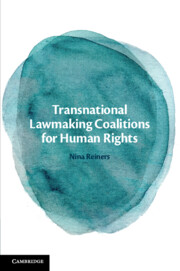Book contents
- Transnational Lawmaking Coalitions for Human Rights
- Transnational Lawmaking Coalitions for Human Rights
- Copyright page
- Dedication
- Contents
- Figures
- Tables
- Acknowledgments
- Abbreviations
- 1 Introduction
- 2 Human Rights Treaty Interpretation
- 3 Transnational Lawmaking Coalitions
- 4 How Water Became a Human Right
- 5 Interpretation across Treaty Bodies
- 6 Lawmaking without Governments?
- 7 Conclusion
- Book part
- Bibliography
- Index
4 - How Water Became a Human Right
Published online by Cambridge University Press: 25 November 2021
- Transnational Lawmaking Coalitions for Human Rights
- Transnational Lawmaking Coalitions for Human Rights
- Copyright page
- Dedication
- Contents
- Figures
- Tables
- Acknowledgments
- Abbreviations
- 1 Introduction
- 2 Human Rights Treaty Interpretation
- 3 Transnational Lawmaking Coalitions
- 4 How Water Became a Human Right
- 5 Interpretation across Treaty Bodies
- 6 Lawmaking without Governments?
- 7 Conclusion
- Book part
- Bibliography
- Index
Summary
With its November 2002 adoption, General Comment (GC) No. 15 on the Right to Water of the ICESCR provided an authoritative base upon which states could better implement their obligations, and individuals and communities could more effectively advocate for the fulfillment of their right to water – and, in doing so, closed a significant gap in human rights law. This chapter forms the book’s empirical entry point into the TLC in practice by showing one such coalition as this story’s protagonist. More specifically, the chapter draws on novel data sources from interviews, background talks, and archival research to reconstruct GC No. 15’s drafting process – telling the story of how water became a human right – to ultimately unearth the TLC and the various aspects of its lawmaking agency in a specific case. Shown with an insular drafting core that both coalesces around a single CESCR member and comprises a select few non-UN technical and legal experts who become involved with great autonomy, the TLC detailed here contours the theoretical expectations advanced in the preceding chapter.
Keywords
- Type
- Chapter
- Information
- Transnational Lawmaking Coalitions for Human Rights , pp. 66 - 93Publisher: Cambridge University PressPrint publication year: 2021

